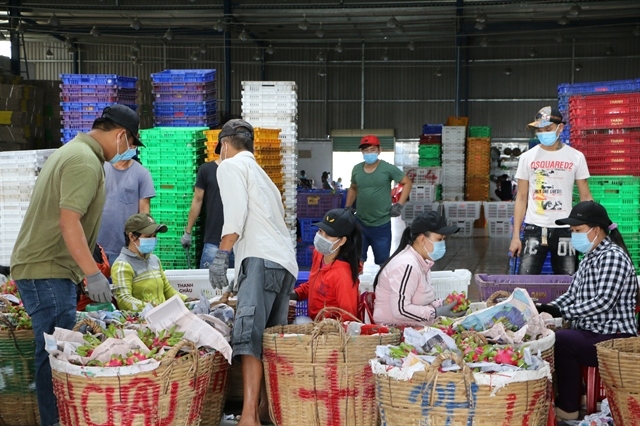China remains largest consumer of Vietnamese farm produce
Despite the recent backlog of vehicles at customs posts, China was still the largest consumer of Vietnamese fruit and vegetables in 2021.

The current backlog has been caused by China tightening border controls on people, vehicles and goods in response to the emergence of Omicron, which has led to sluggish customs clearance. Some border gates are processing customs procedures at a much lower rate than usual.
However, other challenges, such as technical barriers, long risk assessment periods, restrictions on products exported through official quotas to the Chinese market, and frequent changes in its policy on border crossing are also at play.
Despite difficulties in customs procedures, the export of fruits and vegetables still reached US$1.75 billion in the first 11 months this year, an increase of 3.6 % over the same period last year.
The Ministry of Agriculture and Rural Development (MARD) reported that in the first 11 months 2021, the total import-export turnover of agro-forestry-fishery products between the two countries reached more than US$11.3 billion, a 19.5 % increase on the same period last year. Of this figure, exports stood at US$8.47 billion, up 14.5 % over the same period last year.
The General Department of Customs’s statistics showed that export turnover of key products in the first 11 months of 2021 rose against the same period last year. Rice export turnover increased 14.6 % to US$494.7million, cashews were up 24.8 % to US$563.1 million, coffee rose 40.7 % to US$113.7 million and rubber climbed to 26.3 % to US$1.96 billion.
It also saw a decrease in export turnover of seafood with US$862.8 million, down 21.6 % and rattan, sedge, carpet products down 23.1 % to US$7.8 million.
In November 2021 alone, export turnover of fruit and vegetables stood at US$261.5 million, an increase of nine % against October.
Experts are concerned that the export growth momentum of the fruit and vegetable sector is being hindered by China, as China has rolled out even more stringent COVID-19 quarantine and border control rules to counter the threat of Omicron.
General Secretary of the Vietnam Fruit and Vegetable Association Dang Phuc Nguyen said vegetable exports to China would face a hard time over the next three to six weeks, until the 2022 Lunar New Year.
Le Thanh Hoa, Deputy Director of the Department of Agricultural Product Processing and Market Development under MARD, said despite difficulties in customs clearance, the export value of vegetables and fruits still reached more than US$1.7 5 billion in the first 11 months of 2021.
During a recent seminar held in Ha Noi to discuss connecting farm producers with processors and enhancing the domestic market, Nguyen Van Duong - Deputy Director of Mong Cai Border Gate - said that as of December 21, customs clearance procedures through Đông Hưng border gate had been suspended. This had led to the congestion of agricultural products in this border area.
Concerning the increasing congestion at border gates, Dinh Thi Thu, Deputy Director of Lang Son Department of Agriculture and Rural Development, said there were only 100 trucks passing custom clearance every day. Most of them contained dried products.
About 2,900 vehicles are now jammed at the Lạng Son border gate. Many vehicles have to return to Ha Noi to sell their products.
Thu suggested that agencies and ministries conduct more high-level talks with their Chinese counterparts, to allow faster customs clearance for 2,900 containers being stuck at border gates before the Lunar New Year.
To solve the problem of congestion, Le Thanh Hoa said the agricultural sector had conducted many inspections to supervise goods circulation. Many ministries, departments and agencies had also taken drastic action but they still failed to keep up with the changes.
Order 248, regarding "Regulations on registration of enterprises producing imported foreign food", and Order 249, on "Measures to manage import and export food safety", will take effect from January 1, 2022. Hoa noted that Vietnamese businesses and associations needed to pay more attention to improving and enhancing product quality to ensure exports are successful to China.
Tran Thanh Nam, Deputy Minister of MARD, said he would work with his Chinese counterparts to solve the congestion of farm produces at border gates. Nam also reminded local businesses and exporters to promote export to other markets.
He asked domestic processors to closely work with raw material suppliers to help them in this difficult period.
